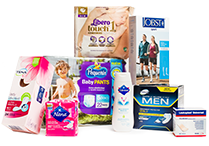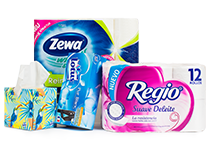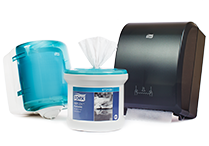Essity’s business model
Our customers and consumers are at the center of Essity’s business model. We begin by building knowledge and understanding of their daily needs and challenges. This unique insight allows us to develop products and services to help simplify everyday life for hundreds of millions of people worldwide.
- Approximately 47,000 employees around the world.
- Approximately 90 production facilities.
- In 2018, Essity purchased raw materials and consumables for approximately SEK 44bn. Essity’s main raw materials are pulp, recovered fiber and oil-based raw materials. Energy costs totaled approximately SEK 5bn.
- Equity amounted to approximately SEK 55bn.
- Net debt amounted to approximately SEK 54bn.
- Essity had a solid investment grade rating.
Leading hygiene and health solutions

Personal Care

Consumer Tissue

Professional Hygiene
Innovations and product launches are a top priority when it comes to delivering increased customer and consumer value and strengthening Essity’s brands and market positions. To contribute to a sustainable and circular society, there is a need for new business solutions and innovations that close the loop.
Input goods, such as pulp, recovered fiber and oil-based raw materials are sourced through a centralized purchasing function to achieve economies of scale and a stronger negotiating position. Essity works throughout the supply chain to guarantee responsible sourcing and we subject our suppliers to stringent demands.
Essity has approximately 90 production facilities worldwide for manufacturing Personal Care, Consumer Tissue and Professional Hygiene products. Efficiency work at our facilities is a continuous process, and includes digitalization and automation, in order to achieve sustainable, efficient, world-class production.
Essity is the global market leader in incontinence products with the TENA brand and in professional hygiene with the Tork brand. Essity also has strong brands in other product categories. Essity has sales in approximately 150 countries and a well-developed and efficient “go-to-market” model. Our products are distributed in a number of ways, from small convenience stores in rural areas to supermarkets, hospitals, healthcare centers, restaurants, pharmacies and e-commerce. In 2018, the retail trade accounted for 58% of Essity’s net sales, business-to-business for 24% and the healthcare sector for 18%.